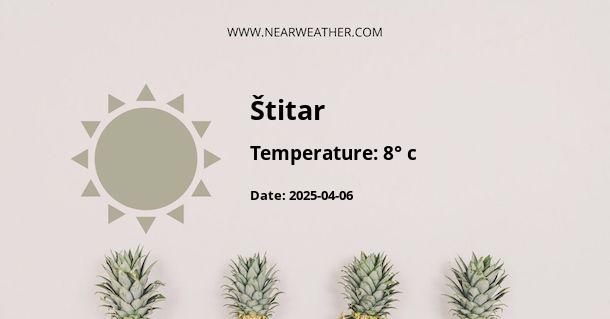Stitar, Croatia: An Overview of Its Distinct Climate and Weather Patterns Throughout the Year
Located in the continental part of Croatia, Stitar is a picturesque village embraced by the charming landscapes of the Slavonia region. The village experiences a climate that is characteristic of the interior areas of Croatia, prominently featuring the effects of both the continental and Mediterranean weather systems. This dual influence results in a climate that offers diversity and variance throughout the seasons. Understandably, the weather patterns in Stitar are dynamic, providing residents and visitors with a range of conditions to enjoy or prepare for across the year.
The Climate Characteristics of Stitar
At its core, Stitar's climate can be classified as humid continental (Dfb under the Köppen climate classification), which typifies areas with significant temperature differences between summer and winter months. This classification is marked by warm to hot summers and cold winters, influenced by air masses moving over the European continent. Given its geographical positioning and topography, Stitar’s climate also receives mild Mediterranean influences that temper the cold snaps in winter and modify the heat during the summer period.
Temperature and Precipitation Patterns
| Month | Average High | Average Low | Average Precipitation |
|---|---|---|---|
| January | 3 | -3 | 40 |
| February | 6 | -2 | 35 |
| March | 11 | 1 | 40 |
| April | 16 | 5 | 50 |
| May | 21 | 10 | 60 |
| June | 24 | 13 | 70 |
| July | 26 | 15 | 60 |
| August | 26 | 15 | 70 |
| September | 22 | 11 | 50 |
| October | 16 | 6 | 40 |
| November | 10 | 2 | 60 |
| December | 4 | -1 | 50 |
Seasonal Weather Overview: What to Expect in Stitar
- Spring (March - May)
-
Spring in Stitar is characterized by a steady increase in temperatures and a gradual decrease in precipitation, feeling the nascent warm Mediterranean breeze. During this season, the snow begins to melt, trees bud, and flowers start to bloom, while rain showers are more frequent, promoting lush greenery throughout the countryside.
- Summer (June - August)
-
The summer months in Stitar bring the cosmopolitan Mediterranean atmosphere into full swing. Days become longer and warmer, often reaching peaks that require respite in the shade or nearby water bodies. This is also the season with the highest precipitation, occasionally in the form of thunderstorms, which are brief but can be quite intense due to the region’s topography that can encourage the rapid development of such weather phenomena.
- Autumn (September - November)
-
Autumn is a transitional period characterized by a significant cooling from the summer highs and an increase in precipitation. The landscape morphs into an array of earthy hues, with harvests concluding and preparations for winter commencing. While September still retains some summer warmth, October and November witness temperatures dropping considerably.
- Winter (December - February)
-
Winters in Stitar are typically cold with temperatures often dipping below freezing, particularly during January, the coldest month. Snowfall is common, casting a silent white blanket over the rural landscape. However, unlike the more Alpine regions to the northwest, Stitar’s snow cover usually doesn’t persist for extended periods, and winters can be less harsh due to the occasional inflow of milder Mediterranean air masses.
Understanding Stitar's Microclimate Influence
Within Stitar's general climate pattern, microclimate variations can exist which subtly influence local weather conditions. Factors such as proximity to water bodies, and small changes in elevation can cause fluctuations in temperature and precipitation. Understanding these nuances is critical when engaging in agricultural activities, which are a significant part of life and economy in the Slavonia region.
Planning Activities According to Stitar's Climate
For those planning to visit or engage in outdoor activities in Stitar, the climate plays an essential role in determining the timing of these endeavors. For instance:
- Agriculture: Planting and harvest times are heavily contingent on the seasonal weather patterns.
- Tourism: Those seeking to explore the natural beauty and cultural heritage of Stitar would find late spring through early autumn ideal for such activities, with pleasant weather complementing their experience.
- Outdoor Events: Festivals and community gatherings are often scheduled in the warmer months to take advantage of the favorable climatic conditions.
Climate Trends and Changes in Stitar
"Over the past few decades, we have observed shifts in the climate patterns, with temperatures experiencing a slight upward trend and precipitation events becoming more erratic. It is vital to keep monitoring these changes to adapt our agriculture and lifestyle accordingly." - excerpt from a local environmental study.
As with many parts of the world, Stitar is not immune to the effects of climate change. Fluctuations in the standard weather patterns can affect not just the natural ecosystem but also the human activities ingrained in the local community. It is increasingly necessary to consider these changes when discussing the weather and climate of Stitar.
Final Insights
Stitar, with its unique climate, offers a distinct Slavonian experience that varies from warm summer waves to crisp winter frosts. The weather in Stitar is not just a backdrop but a pivotal feature that shapes everyday life. Whether involved in agriculture, planning a touristic venture, or simply relishing the harmonious shifts in seasons, understanding Stitar's climate is key to appreciating and harmonizing with the rhythm of this enchanting Croatian village.
A - Štitar's Latitude is 45.095558 & Longitude is 18.640280.
A - Weather in Štitar is 8° today.
A - Climate Conditions in Štitar shows overcast clouds today.
A - Humidity in Štitar is 67% today.
A - Wind speed in Štitar is 26.64 km/h, flowing at 359° wind direction. today.
